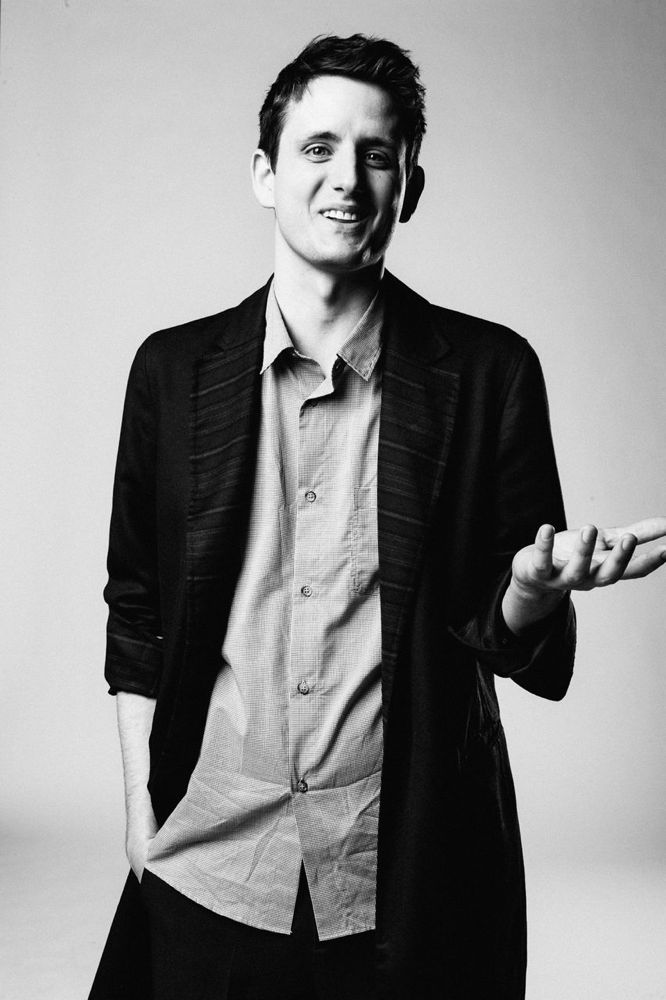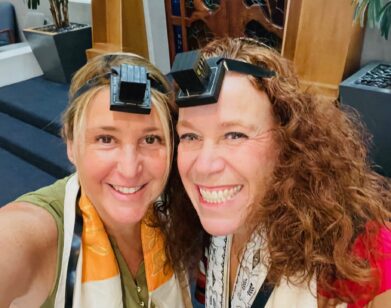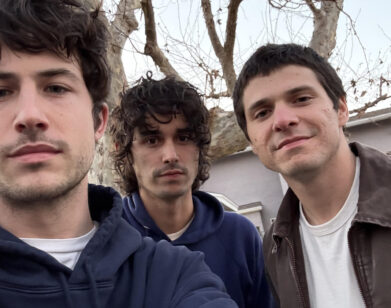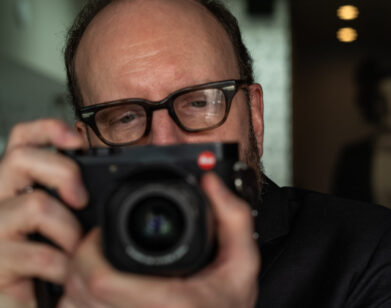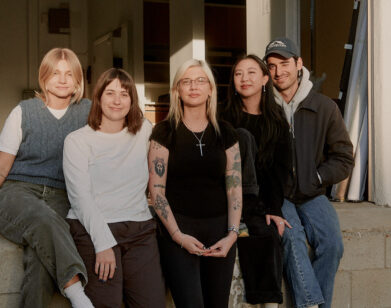Zach Woods and Human Comedy
ZACH WOODS IN LOS ANGELES, APRIL 2015. PHOTOS: BY CARA ROBBINS. STYLING: RITA ZEBDI/JED ROOT. GROOMING: DANIELE PIERSONS FOR EXCLUSIVE ARTISTS USING ORIBE HAIR CARE.
“I don’t know anything about tech, but I do know something about slightly socially crippled and overly cerebral guys,” says Zach Woods with a laugh. While a humorous assertion, his choice of television and film roles would certainly support it.
Woods, who was raised in Pennsylvania and graduated from NYU, began his career at the Upright Citizens Brigade Theater in New York as a skilled improviser and teacher. He frequently performed with the group The Stepfathers and in the weekly show Asssscat. After moving to the West Coast, Woods had a few supporting roles in comedic films (In the Loop, The Other Guys) before landing a meatier role on The Office as Gabe Lewis, a quietly apprehensive, romantically unlucky, and frequently mocked director at Dunder Mifflin.
Now 30, Woods is currently starring on HBO’s hit sitcom Silicon Valley as Jared, a gangly and pathos-inducing Fortune 500 tech company executive-turned-head of business development at a promising music app startup. Jared is both an easy target for his colleague’s frustrations and a bearer of terrible misfortune (for starters, he gets trapped in a self-driving car that ends up stranded on a remote island due to a programing error). Despite his tribulations, though, it’s clear that underneath Jared’s delightful naiveté is a shrewd and intellectual businessman who’s elevating the startup, Pied Piper, into a tech tour de force. “I’ll admit I’m sleep challenged. I just spent four days trapped in a steel box out in an oil rig full of robot forklifts,” his relentlessly optimistic character proclaims after returning from his island exile. “But now I’m back, and I’m recovering, and I’m focused, and we’re going to pivot.”
ZACH WOODS: Fair warning, I’m pulled over on the side of the road. I’m on my way to pick up my parents from the airport. [phone connection fails] What happened?
DEVON IVIE: That was mildly terrifying. There was a very horrible sound for 30 seconds. I didn’t know what was happening.
WOODS: What did it sound like?
IVIE: UFO abduction-esque, it was very vague. I’m glad you’re okay.
WOODS: I was not being biopsied by an extra-terrestrial.
IVIE: Do you remember what your first experience with comedy was when you were growing up?
WOODS: Well, there are a few things. I remember the first joke that I made, which went over terribly. I was at my cousin’s birthday party in Brooklyn. I was a little kid and she was a little older. They were going around introducing themselves; I was probably four, and I was very eager to impress all of these older New York kids. They went down the line and were like, “I’m Jake,” “I’m Jane,” “I’m Silvia,” and I said, “I’m hungry,” because I thought that was really going to bring the house down. It was a resounding failure. My uncle was like, “yeah, but what’s your real name?” But actual comedy…oh, here’s something. When I was a kid my father would read Neil Simon plays with me when I was going to bed, as bedtime stories. All of these old plays like The Odd Couple and Lost in Yonkers—funny but corny plays about Jewish New Yorkers in the mid-20th century. I remember listening to comedic musicals and thinking they were a real riot. I had pretty questionable taste in comedy. [laughs] For the first actual comedy-comedy I did, I took a comedy class in New York, which was full of slightly unhinged people. It was a pretty depressing crowd, very angry and strange people. But then I took a class at the Upright Citizens Brigade and I loved those people.
IVIE: How did you discover the Upright Citizens Brigade?
WOODS: When I was a kid I wanted to be a musician. I used to play the trumpet. I practiced all the time, but I got braces and I couldn’t play it anymore, so I had all of this free time. My brother, who’s a few years older then me, went to college in New York. I lived in Pennsylvania at the time, but he told me about a show called Asssscat, which is kind of like the flagship show at Upright Citizens Brigade. He said all of these people from Saturday Night Live do improv together there, and I thought, “Oh, that sounds really cool.” So when I got braces and couldn’t play music anymore, I said to my parents that I wanted to go to New York and take a class at that place. They were remarkably on board with it. I got on the train, went up, took a class and I loved it.
IVIE: I know you also taught improv in the past. What made you want to become a teacher?
WOODS: Desperate financial circumstances.
IVIE: At least you’re honest about it.
WOODS: [laughs] I actually really liked teaching. I started teaching at UCB when I was in college, actually. I would get class credit at college—I would get someone to fill out an internship form or something so I would get the credit. But why did I start teaching? I loved it. I loved doing improv and loved UCB and wanted to be a part of that world and that community. To the extent that they would have me…to me, it was an honor.
IVIE: What advice would you give young improvisers beginning their careers in comedy?
WOODS: I guess it depends on what they want. There’s some boring advice like “see as much of it as you can and do as much of it as you can.” Volume, in a way, is the most important thing. Not, like, decibel volume—just immerse yourself in it as much as possible. I’d also suggest that you put a high value on your personal interests and tastes. I think sometimes when people start doing improv there’s some regression towards trying to replicate the “good” improvisers that they’ve read about in their improv books or heard about from their teachers. That’s understandable, because they’re trying to learn technique and stuff, but I actually think that my favorite performers are ones who have unique improv technique but also have a unique point of view that you can feel with them and their performances. That’s the most unbelievably dry answer. [laughs]
IVIE: Do you feel that your sense of humor has changed throughout the years?
WOODS: Yeah, I do think it has. I’m still standing by that “I’m hungry” joke. That’s still the measuring stick by which I evaluate every comedic contribution that I make, the incredibly high bar I set for myself with that piece of shit joke. [pauses] This is the problem with good questions that I haven’t been asked before—I don’t have a spiel for it. [laughs] As I get older, I think I’m more interested in comedy that doesn’t take cheap shots. But I watched some of that Justin Bieber “roast” and I thought it was hilarious. This is going to sound pretentious, but I like comedy that addresses something I find either worrisome or interesting in my life. I like Louis C.K.’s stuff or Bill Burr’s stuff. I feel like there’s comedy where someone will think of something that they think will work comedically, and then they reverse engineer that point of view so they can say that funny thing. The comedians I like, it could be an allusion, but it feels like their point of view comes first and then the jokes are a reflection of what they actually believe, or are frightened of, or are curious about, or are interested in.
IVIE: What was it that initially piqued your interest in the script for Silicon Valley?
WOODS: I thought with Mike Judge [executive producer, writer and director] and HBO, in the snobby comedic impulse in my brain, that the odds of this being good were so high before I even read the script. The show changed a lot, actually. They reshot parts of the pilot and for my part there were a lot of changes in particular. The show as it is now was not all there in the pilot’s script. The thing that I was always drawn to was that the show felt confident. It didn’t feel like it was loaded up with as many zingers as possible or grasping for laughs—it felt like a unique world.
IVIE: What were some of the changes they made to your character, Jared, after the initial pilot was shot?
WOODS: Initially in the pilot Jared was much more part of the Hooli “world.” One of the first constants I had was a suede jacket and this sharp shirt—he seemed more of a dickhead originally. Not evil, just one of those movers and shakers at a big company. He was still subservient to Gavin [Belson] but he was much more of a harder person. In the second episode, which is written by this amazing writer Carson Mell, they had all of these jokes, like, “Sorry if I scared you. I know I have somewhat ghost-like features.” There’s one joke that got cut, but it was something like “I feel most comfortable when I can take on the shape of whatever shoe is pushing down on me.” They cut it because it was too sad and pathetic. [laughs]
IVIE: How much did you know about the real-life Silicon Valley and cult-like tech culture before signing onto the show?
WOODS: Almost nothing. My cousin actually works in Silicon Valley and I’ve seen videos of him doing something similar to TechCrunch presentations, like what happens at the end of the first season. But I hadn’t talked to him much about that. I really knew almost nothing about it. I read that Steve Jobs book and watched a bunch of documentaries, and read the book about Mark Zuckerberg. I tried to learn some stuff, but there are consultants on the show that know so much about it where you can get answers. To me, it’s more important to get the particulars about that type of person as opposed to the specifics of the technology world. Does that make sense? I kind of wanted to know what that kind of guy is. I feel all of the archetypes in Silicon Valley probably exist in some other form in other subcultures. I feel like I’m giving a lot of very Gallatin answers. Feel free to attack me with knifes…
IVIE: Never! How would you describe Jared’s relationship with the Pied Piper team?
WOODS: It’s funny. Sometimes when I meet people—once in a while someone will stop me on the street and want to talk about the show—I’m always so surprised in the way that people talk about me. In my head, he loves them with every fiber in his being. He wants to be part of their crowd and their world more than he probably is. I think of him as one of those self-sacrificing mothers who wants to make sure that everyone has the best Christmas, but then doesn’t get any gifts and does all the holiday cooking. But if everyone else is smiling, then it’s worth it for her.
IVIE: Are we going to see Jared snap or have an explosive cathartic moment sometime this season?
WOODS: I’m trying to figure out how to say this without spoiling anything…there are some things from his life and his past, his emotional life, that are expressed through some sleep issues. I don’t know if he snaps exactly, but he does get a little more forceful than he usual is. There is actually a lot of stuff where you get to see some dimensions of Jared that you haven’t seen before. There’s a situation where he has to advocate on behalf of the company…these big companies are kicking him around when he calls. Because Pied Piper is a small company, he takes on a new approach that’s atypical of his gentleness.
IVIE: Would you ever consider a role in a drama, or do your interests lie strictly in comedy?
WOODS: I would love to do a drama. I did a couple of episodes of The Good Wife, which is more of a drama. I really liked that; I thought it was interesting. A lot of my favorite comedies play out as dramas. I usually don’t like the crazy cartoonish comedies, but that’s not always the case—I love Dumb and Dumber and shit like that. A lot of times the movies I think are the funniest are dramas. I don’t go to see many comedies anymore, because I guess it feels like another day at the office. I feel like dramas are so much funnier because they’re actually capturing human beings. Humans are so weird and clumsy, and that, to me, often makes me laugh more. So I would love to do a drama, yes.
SILICON VALLEY AIRS SUNDAYS ON HBO.

